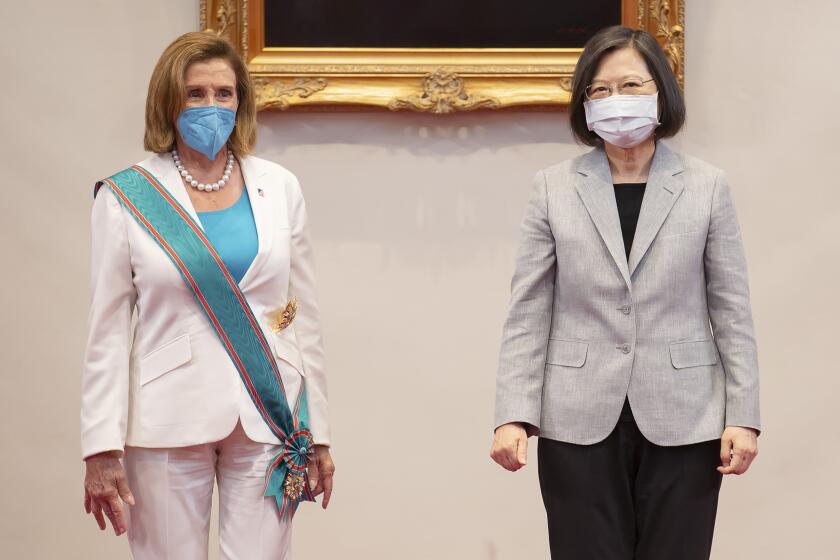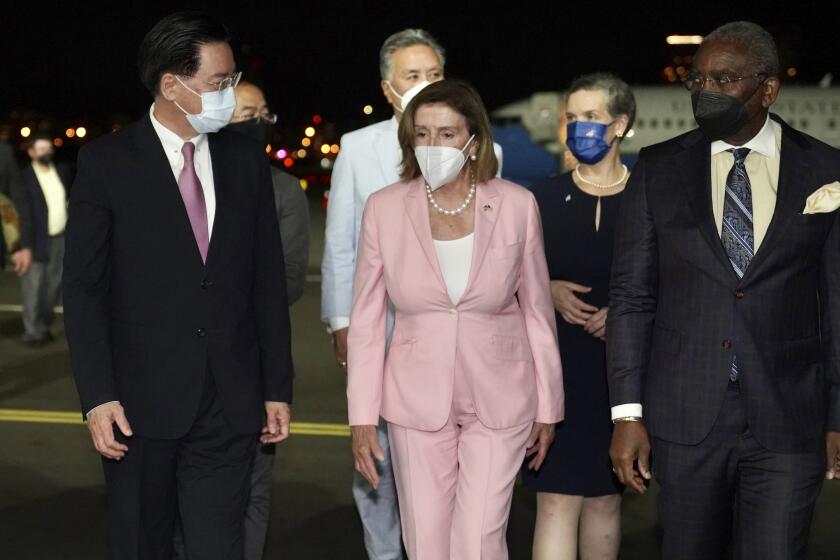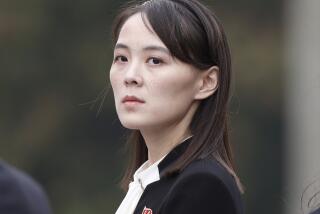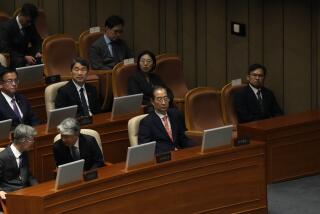In South Korea, Pelosi avoids publicly commenting on Taiwan and China
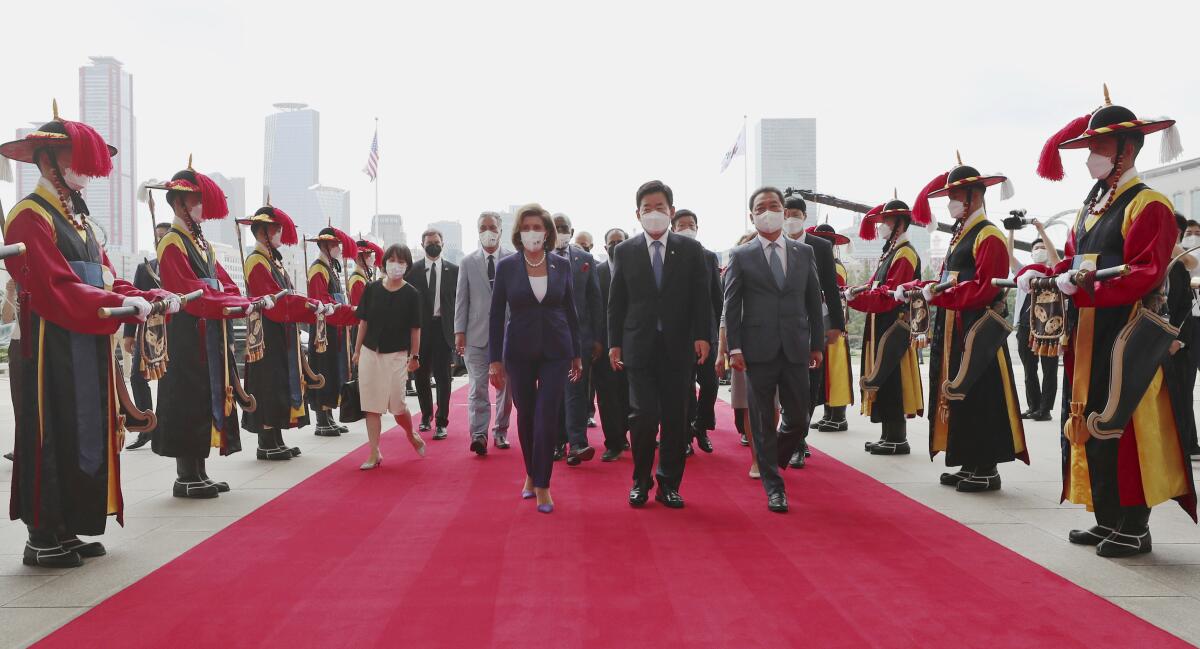
- Share via
SEOUL — After infuriating China with her stop in Taiwan, U.S. House Speaker Nancy Pelosi met with South Korean political leaders Thursday but avoided making direct public comments on relations with Beijing and Taipei that could further increase regional tensions.
Pelosi, the first House speaker to visit Taiwan in 25 years, said Wednesday in Taipei that the American commitment to democracy on the self-governing island and elsewhere “remains iron-clad.” In response, China on Thursday began military exercises, including missile training, in six zones surrounding Taiwan, in what could be the biggest maneuvers of their kind since the mid-1990s.
After visiting Taiwan, Pelosi (D-San Francisco) and other members of her congressional delegation flew to South Korea — a key U.S. ally where about 28,500 American troops are deployed — on Wednesday evening, as part of an Asian tour that included earlier stops in Singapore and Malaysia. After South Korea, Pelosi will travel to Japan.
She met South Korean National Assembly Speaker Kim Jin Pyo and other senior members of parliament Thursday. After that hourlong meeting, Pelosi spoke about the bilateral alliance, forged in blood during the 1950-53 Korean War, and legislative efforts to boost ties, but didn’t directly mention her Taiwan visit or the Chinese protests.
“We also come to say to you that a friendship, a relationship that began from urgency and security, many years ago has become the warmest of friendships,” Pelosi said in a joint news conference with Kim. “We want to advance security, economy and governance in the inter-parliamentary way.”
Neither Pelosi nor Kim took questions from journalists.
China’s furious response could drive more Taiwanese toward independence and push neighboring Asian nations to strengthen their defense strategies.
Kim said he and Pelosi shared concerns about North Korea’s increasing nuclear threat. He said the two agreed to support their governments’ push for denuclearization and peace on the Korean Peninsula based on both strong deterrence against North Korea and diplomacy.
Pelosi and her delegation later spoke by phone with South Korean President Yoon Suk-yeol on the alliance, foreign policy and other issues. Yoon is on vacation this week, but critics accuse him of intentionally shunning a face-to-face meeting with Pelosi out of consideration to ties with China, South Korea’s biggest trading partner. Yoon’s office said that it had reviewed national interests and that Yoon’s vacation plan had already been set up when, about two weeks ago, Pelosi’s side contacted his office about a possible meeting.
During the phone conversation, Pelosi and other members of her congressional delegation didn’t bring up the Taiwan issue, and Yoon also didn’t raise the matter, Yoon’s office said.
In recent years, South Korea has been struggling to strike a balance between the U.S. and China as the two superpowers’ rivalry has deepened. Yoon, a conservative, took office in May with a vow to boost South Korea’s military alliance with the U.S. and take a tougher line on North Korean provocations.
For Pelosi, the Taiwan visit is a legacy-building trip that may serve as a capstone to her long record as a critic of China.
Later Thursday, Pelosi was to visit a border area with North Korea that is jointly controlled by the American-led United Nations Command and North Korea, South Korean officials said. If that visit occurs, Pelosi would be the highest-level American to go to the Joint Security Area since then-President Trump visited in 2019 for a meeting with North Korean leader Kim Jong Un.
Yoon said Pelosi’s visit to the Joint Security Area, or JSA, would demonstrate “a strong deterrence against North Korea” by the allies, said Kim Tae-hyo, a deputy presidential national security advisor.
South Korean media, citing no sources, later reported that Pelosi visited the JSA but gave no further details. The U.S. Embassy in Seoul, the U.N. Command and the South Korean Defense Ministry couldn’t immediately confirm the reports.
Sitting inside the 2½-mile-wide Demilitarized Zone, a buffer created at the end of the Korean War, the JSA is the site of past bloodshed and the venue of numerous talks. U.S. presidents and other top officials have often traveled to the JSA and other border areas to re-affirm their security commitment to South Korea.
Any statement critical of North Korea by Pelosi is certain to draw a furious response from it. On Wednesday, the North’s Foreign Ministry slammed the U.S. over her Taiwan trip, saying that “the current situation clearly shows that the impudent interference of the U.S. in internal affairs of other countries ... [is] the root cause of harassed peace and security in the region.”
More to Read
Sign up for Essential California
The most important California stories and recommendations in your inbox every morning.
You may occasionally receive promotional content from the Los Angeles Times.
